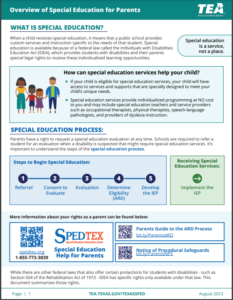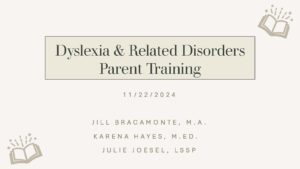What is Dyslexia?
Dys-lexia
- dys—difficulty
- lexia—with words
More information on Dyslexia and related disorders is available from the Texas Education Agency here.
Dyslexia Handbook
Texas Dyslexia Handbook 2024 – English
Texas Dyslexia Handbook 2024 – Spanish
To request a copy of The Dyslexia Handbook, Procedures, Concerning Dyslexia and Related Disorders, 2024 Update, contact University of Texas Charter School System Special Programs Department.

Questions & Answers:
Who do I talk to regarding my concerns about my student possibly having dyslexia?
It is recommended that you first contact your student’s teacher to discuss your concerns related to your child’s progress in reading. After talking to your student’s teacher, you may wish to express your concerns to your school administration.
What is the process for a dyslexia assessment?
One change to the Dyslexia Handbook is with the process schools must follow for identifying dyslexia or dysgraphia. Now, anytime the school suspects a student has dyslexia or dysgraphia and needs services, they must ask for parent consent to conduct a Full Individual Initial Evaluation (FIIE) under IDEA. This change makes sure that schools are meeting their requirement under federal law to find and evaluate students who have or are suspected of having a disability and needing special education services. This requirement is called Child Find.
Evaluations through the IDEA process makes sure that students who are eligible for special education services are identified and provided the supports they need.
If your child is not receiving special education services, but is identified with dyslexia and receiving intervention services from the school, your child’s progress should be carefully monitored, and you should get regular updates. If your child is making good progress and you agree with the current supports and services, your child can continue with the same instruction, even if they are not receiving special education. However, if you are concerned about progress and/or suspect that your child may need special education services, you have the right to request an evaluation under the IDEA. If the school suspects your child may need special education services, they must refer your child for an evaluation. Based on the evaluation, you and the school may decide during an Admission, Review, and Dismissal (ARD) committee meeting that your child needs special education services.
Records Requests:
-To request special education records, have your campus registrar TRex a request to the campus (district number is 227819), submit a Frontline records request or contact the UT Elementary campus registrar by calling 512-495-3300.
Additional Resources:
- 5 Steps a Parent Can Take (Yale Center for Dyslexia & Creativity)
- Visual Processing and Dyslexia: Visual Motion Processing is Not a Cause of Dyslexia (O. Olulade, E. Napoliello, and G. Eden (2013).Center for the study of learning: Georgetown University).




